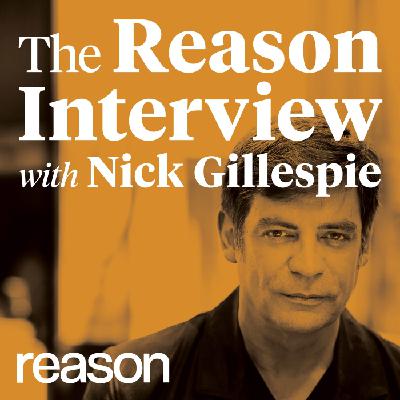Kennedy: A Gen X Rebel's Journey From MTV to Fox News
Description
Today's guest is the former MTV video jockey and current Fox News personality Kennedy, who emerged in the 1990s as a leading voice of Gen X when it came to politics and culture. Reason's Nick Gillespie talks with her about how a generation raised on neglect, nuclear nightmares, and Nirvana forged an ethos of irreverence and independence that still matters today. Kennedy explains her evolution from a teen Republican who swooned over Dan Quayle to a principled libertarian, why the culture of alternative music and media once felt so alive and vital, and what it means when former pop culture rebels like Jimmy Kimmel and Howard Stern become defenders of the status quo. She also talks about free-range parenting and why more of us need to stop caring about what others think and let everyone live radically on their own terms.
0:00 —Introduction
2:30 —What was MTV like when Clinton was elected president?
730—How did Kennedy become a 'self-declared libertarian'?
12:20 —What is the most appealing about libertarianism?
15:01 —How did being 'alternative' become mainstream?
22:07 —What was it like being a public virgin?
25:42 —What is the Gen X ethos?
31:22 —Why you can make fun of everything
36:58 —How Jimmy Kimmel and Adam Carolla went down vastly different paths
41:07 —What is it like to work at Fox News?
47:25 —Are conspiracy theories fun?
Upcoming events:
- Reason Versus debate: Jacob Sullum and Billy Binion vs. Charles Fain Lehman and Rafael Mangual, June 24
- Reason Speakeasy: Nick Gillespie and Elizabeth Nolan Brown on the MAHA Movement, June 25
- The Reason Roundtable Live in New York City, July 15
Today's sponsor:
- Future of Freedom: If you're tired of cable news debates and Twitter shouting matches, and you're looking for serious, good-faith conversations between people who actually care about liberty then it's time to check out the Future of Freedom podcast. Each episode dives deep into a single topic—tariffs, campus speech, the Department of Government Efficiency—and brings together two guests who disagree on the best path forward. But here's the twist: This isn't a debate show. No interrupting. No dunking. If you believe the future of freedom depends on more than just winning arguments and you're ready for something deeper than the usual echo chambers, check out the Future of Freedom podcast. Real disagreement. Real ideas. Real conversations. Subscribe to Future of Freedom wherever you get your podcasts.
Transcript
This is an AI-generated, AI-edited transcript. Check all quotes against the audio for accuracy.
Nick Gillespie: This is The Reason Interview With Nick Gillespie.
All right, so we know the names, right? The single-named beings that stride our planet like latter-day gods—Madonna, Prince, Sting, Björk, Liberace, and, of course, Kennedy, my guest tonight. Kennedy, thanks for talking.
Kennedy: Thank you, and thank you, Nick Gillespie.
I'm not sure which name I want to get—should I get rid of Nick or Gillespie or come up with something new? Evita's up for grabs.
Evita Portmanteau, I think. Evita.
Evita, right? Let's talk about the early days of Kennedy as a public figure. You started working at MTV around 1992.
Correct. It was September of 1992, right before Bill Clinton was elected.
Yeah. I want to spend a lot of time talking about Gen X. Even though I am a part of the baby boom, I've become possessed with the idea that Gen X is the best generation, and its characteristics are what we need in America today.
But before we get to that, because you mentioned Bill Clinton and that was the big generational shift—he was the first baby boom president—can you paint a scene? What was it like at MTV when Bill Clinton won the presidency?
It was so hopeful. People were so optimistic in New York, and, of course, MTV at the time was populated by East Coast elites, big-city liberals. A lot of people had gone to places like Yale and Dartmouth, and a lot of Emerson College graduates were at MTV, and they were ready—
So, a lot of miming in the hallway.
Yeah, so much mummenschanz.
And they were ready for their president. The MTV News department, which was fairly new and gaining influence at that time, they were putting a lot of money and resources into MTV News and wanted to cover the political campaign in a new way for this generation—who were just interfacing with politics and news for the first time.
When Bill Clinton was elected, they didn't really pay attention to the data. They just looked at everything and looked at all the coverage, the publicity that the Choose or Lose campaign got—and they were like, "Well, MTV elected Bill Clinton. And you are so welcome."
They didn't talk about Ross Perot. They didn't talk about the 12 years of the Reagan-Bush era. It was just like, "no, MTV was here and ordained Bill Clinton as president." It was a massive shift.
It's hard to recover that, and I think we're going through something similar now—which will probably fully come online in a couple years—where it's the first millennial president or something.
But you were the resident Republican at MTV. What were you thinking? And why were you a Republican, and what did that mean to you?
I was a Republican because I grew up in Oregon where everyone was liberal, and the people who were really into politics didn't seem particularly happy.
<span style="






